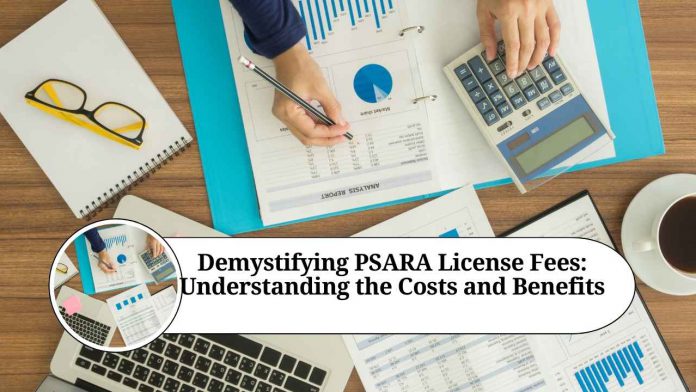In today’s ever-evolving security landscape, the need for professional security services has become paramount. To ensure the quality and reliability of these services, the Government of India introduced the Private Security Agencies Regulation Act (PSARA) in 2005. Under this act, security agencies are required to obtain a PSARA license to operate legally. While obtaining a license is essential, one aspect that often raises questions is the associated fees. In this blog, we will delve into the details of PSARA license fees, exploring their significance, factors influencing costs, and the benefits of acquiring a PSARA license.
Understanding PSARA License:
The PSARA license is a mandatory legal requirement for private security agencies operating in India. It serves as an assurance of the agency’s credibility, adherence to regulations, and commitment to providing reliable security services to clients. The license ensures that the agency maintains specific standards in terms of training, infrastructure, and employee background checks.
Factors Influencing PSARA License Fees:
Several factors contribute to the determination of PSARA license fees. While the exact fees may vary from state to state, here are some common factors that influence the costs:
- Jurisdiction and Geographical Location: Different states in India may have varying fee structures and regulations. For instance, license fees in metropolitan cities like Mumbai or Delhi may be higher compared to smaller towns or rural areas.
- Agency Size and Operations: The size of the security agency and the scale of its operations play a role in determining the license fees. Larger agencies with a wider range of services and a significant number of personnel may incur higher costs.
- Duration of License: PSARA licenses are typically valid for a specific period, usually one to five years. The fees may differ depending on the duration of the license. Longer durations may require higher fees upfront.
- Additional Services: Some security agencies may provide additional services, such as armed guards or special event security. If an agency offers such services, the license fees may be higher due to the additional training and compliance requirements.
Benefits of Obtaining a PSARA License:
While the cost of acquiring a PSARA license may seem like an expense, it is essential to consider the long-term benefits associated with it:
- Legal Compliance: Operating without a PSARA license can lead to legal repercussions, including fines, closure of business, and damage to reputation. Acquiring a license ensures that your security agency operates within the confines of the law.
- Trust and Credibility: Holding a PSARA license enhances your agency’s reputation and instills confidence in clients. It assures them that your services meet the necessary standards and that you prioritize professionalism and reliability.
- Competitive Edge: In a crowded security services market, a PSARA license sets you apart from unlicensed agencies. It demonstrates your commitment to quality, compliance, and accountability, giving you a competitive advantage.
- Access to Contracts: Many government and corporate organizations require security agencies to hold a PSARA license to be eligible for contract bids. By obtaining the license, you expand your business opportunities and increase your chances of securing lucrative contracts.
Conclusion:
While PSARA license fees may appear as an additional cost, they are an investment in the long-term success and credibility of your security agency. By complying with legal requirements and acquiring a PSARA license, you gain numerous benefits, including trust, competitive advantage, and access to a wider range of clients. It is crucial to research and understand the specific fee structures and regulations in your jurisdiction to ensure compliance. Ultimately, obtaining a PSARA license reinforces your commitment to professionalism, quality, and the safety of your clients, setting you on a path to thrive in the private security industry.
Read more useful content:
FAQ’S
Q1: What are PSARA license fees?
A1: PSARA license fees refer to the charges imposed by the government for obtaining a license under the Private Security Agencies Regulation Act (PSARA). These fees are required to be paid by private security agencies operating in India to ensure compliance with the law.
Q2: How are PSARA license fees calculated?
A2: PSARA license fees are calculated based on several factors, including the jurisdiction and geographical location of the agency, the size of the agency and its operations, the duration of the license, and any additional services provided by the agency. The exact fee structure may vary from state to state.
Q3: Do PSARA license fees vary across different states in India?
A3: Yes, PSARA license fees can vary across different states in India. Each state has its own fee structure and regulations for private security agencies. Metropolitan cities may generally have higher fees compared to smaller towns or rural areas.
Q4: How often do I need to pay PSARA license fees?
A4: PSARA license fees are typically paid when applying for or renewing a license. The frequency of payments depends on the duration of the license, which can range from one to five years. It is important to keep track of the renewal dates to ensure uninterrupted operation of your security agency.
Q5: Are there any additional costs associated with PSARA licenses?
A5: In addition to the license fees, there may be other costs associated with obtaining and maintaining a PSARA license. These costs can include expenses related to employee background checks, training programs, infrastructure requirements, and any special compliance measures mandated by the regulatory authorities.
Q6: Can I operate a security agency without a PSARA license?
A6: No, operating a security agency without a valid PSARA license is illegal in India. The PSARA license is a mandatory requirement for private security agencies to ensure adherence to regulations, maintain industry standards, and provide reliable services to clients. Operating without a license can lead to legal consequences, including fines and closure of the business.
Q7: Are there any benefits to obtaining a PSARA license despite the associated fees?
A7: Yes, obtaining a PSARA license offers several benefits. It ensures legal compliance and protects your agency from potential legal consequences. It also enhances your agency’s credibility, instills trust in clients, and gives you a competitive edge in the market. Furthermore, holding a PSARA license may provide access to government and corporate contracts, expanding your business opportunities.
Q8: Can the PSARA license fees be negotiated or reduced?
A8: PSARA license fees are typically determined by the government authorities and follow a standardized fee structure. Negotiating or reducing the fees may not be possible in most cases. It is advisable to consult with the relevant regulatory authorities or seek legal advice for any specific queries related to fee reductions or waivers.
Q9: Can the PSARA license fees be refunded if the license is not granted?
A9: PSARA license fees are usually non-refundable, regardless of whether the license application is approved or not. The fees cover administrative costs associated with processing the license application and are generally not refunded in case of rejection.
Q10: Can the PSARA license fees change over time?
A10: The government has the authority to revise the PSARA license fees periodically. It is essential to stay updated with the latest fee structure and regulations in your state or jurisdiction to ensure compliance with any changes in the fee requirements.




















